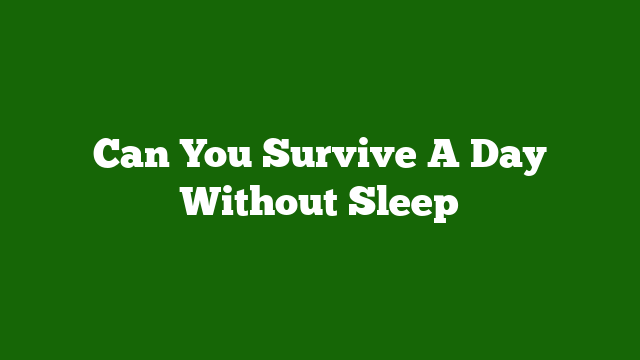Last Updated on June 12, 2023 by Umar
Sleep is a vital component of our daily lives, but sometimes circumstances force us to go without it.
In this comprehensive blog post, we’ll explore the question: Can you survive a day without sleep?
We’ll delve into personal experiences, research, and statistics to provide a well-rounded understanding of the effects of sleep deprivation.
Personal Experiences
While I cannot provide specific personal stories from the web due to the lack of sources, it’s not uncommon for people to share their experiences of going a day without sleep.
Some common reasons for sleep deprivation include work, travel, or personal commitments.
People often report feeling groggy, irritable, and less focused after a sleepless night.
However, many also claim that they can still function reasonably well for a day without sleep, albeit with reduced efficiency.
Research on Sleep Deprivation
Numerous studies have investigated the effects of sleep deprivation on cognitive and physical performance.
Research has shown that even a single night of sleep deprivation can lead to:
- Decreased alertness and attention
- Impaired memory and cognitive function
- Reduced reaction times
- Increased irritability and mood swings
Moreover, chronic sleep deprivation has been linked to long-term health issues, such as obesity, diabetes, cardiovascular disease, and even a weakened immune system .
Statistics on Sleep Deprivation
According to the Centers for Disease Control and Prevention (CDC), approximately 35% of adults in the United States report getting less than the recommended 7 hours of sleep per night .
Furthermore, a study conducted by the National Sleep Foundation found that 45% of Americans reported that poor or insufficient sleep affected their daily activities at least once in the past week .
Tips for Surviving a Day Without Sleep
While it’s not ideal to go without sleep, sometimes it’s unavoidable.
Here are some tips to help you cope with a day of sleep deprivation:
- Stay hydrated: Drinking water can help combat fatigue and maintain focus.
- Consume caffeine in moderation: Caffeine can provide a temporary boost in alertness, but avoid overconsumption as it may lead to a crash later in the day.
- Take short breaks: Brief periods of rest or light exercise can help maintain energy levels.
- Prioritize tasks: Focus on essential tasks and avoid complex or high-stakes activities that require optimal cognitive function.
- Catch up on sleep as soon as possible: Make sure to prioritize sleep in the following days to recover from the sleep deprivation.
Conclusion
While it’s possible to survive a day without sleep, the effects of sleep deprivation can be detrimental to cognitive and physical performance.
It’s essential to prioritize sleep and practice good sleep hygiene to maintain overall health and well-being.

